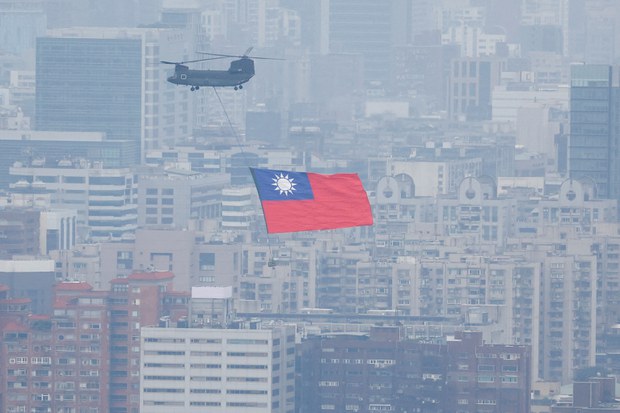Taiwan continues to reject reunification as China’s leader makes it a priority
Share

A Chinook helicopter carrying a Taiwan flag flies over Taipei during the country’s National Day celebration, Oct 10, 2022.
Taiwan has responded to Chinese leader Xi Jinping’s remarks at the 20th Congress of the Communist Party of China (CPC), reiterating that Taiwanese people reject the policy of ‘One Country, Two Systems’ pursued by China.
In his opening speech on Sunday, President Xi said the CPC will “unswervingly advance the cause of national reunification.”
Xi outlined the official policy towards Taiwan that includes a firm warning on the use of force “directed solely at interference by outside forces and the few separatists seeking ‘Taiwan independence’ and their separatist activities.”
“Resolving the Taiwan question is a matter for the Chinese, a matter that must be resolved by the Chinese,” stated Xi, who also serves as Chairman of the Central Military Commission.
“We will continue to strive for peaceful reunification with the greatest sincerity and the utmost effort, but we will never promise to renounce the use of force, and we reserve the option of taking all measures necessary,” he said.
Hitting back at Xi Jinping’s speech, Taiwan’s Presidential Office Spokesperson Chang Tun-han said “the Republic of China is a sovereign and independent country, and democracy and freedom are the belief and persistence of the Taiwanese people.”
The Republic of China (ROC) is the official name of Taiwan, a self-governed democratic society of 24 million people that Beijing considers one of China’s provinces.
“It is the consensus of the Taiwanese people that territorial sovereignty, democracy and freedom cannot be compromised and that military confrontation is not an option for both sides of the Strait,” said Chang.
“Taiwan’s position is very firm,” the spokesman said.
Taiwan is “willing to work with Beijing authorities to find a mutually acceptable way to maintain peace and stability in the Taiwan Strait,” Chang Tun-han added.
‘The right to use force’
Xi Jinping’s remarks signaled a shift in Beijing’s policy towards Taiwan, noted a Taiwanese analyst who also said that Taiwan has now become a priority for the Chinese leader after the Hong Kong issue was considered “resolved”.
Wang Hsin-hsien, a professor of East Asian Studies at the National Chengchi University in Taipei, told the official Central News Agency (CNA) that cross-Taiwan Strait relations now become “an integral part of the China-United States rivalry.”
Xi’s rhetoric was firmly directed against Taiwan independence and interference by outside forces, Wang noted.
Following U.S. House Speaker Nancy Pelosi’s August visit to Taiwan and the recently proposed Taiwan Policy Act (TPA) at the U.S. Congress, China conducted regular military drills around Taiwan and increased activities seen by Taipei as provocative.
One day before the opening of the CPC Congress, Communist Party spokesman Sun Yeli told a press conference that China “reserves the right to use force over Taiwan as a last resort.”
Recently the Chinese People’s Liberation Army Navy (PLAN) “successfully carried out a full test” of combat capability of a group of its amphibious assault ships, China’s state television network CCTV reported.
A CCTV report on Oct. 13 showed China’s domestically developed Type 075 amphibious assault ships Hainan and Guangxi taking part in a “joint multidimensional amphibious landing and maritime replenishment drills in an undisclosed area in the South China Sea.”
The Type 075s are landing helicopter docks capable of operating helicopters. They also have well decks used for transporting armored vehicles. The PLAN has two Type 075 ships and is soon putting a third into service.
During the drills, marines were carried by helicopters to an “enemy’s beach” to conduct a beach assault, supported by landing craft and amphibious armored vehicles – a scenario that could emerge during a Taiwan Strait’s conflict.
This move could potentially boost the PLAN’s capabilities in attacking Taiwan, said Shen Ming-Shih, acting deputy chief executive officer at Taiwan’s Institute for National Defense and Security Research, a government think-tank.
However, “the PLA Army and Marine Corps have about 14 amphibious landing brigades but not enough ships like the Type 075s to transport them,” Shen told RFA.
Currently the PLA still has to use civilian cruise ships to assist landing operations and “these large ships are easy targets for Taiwan’s long-range anti-ship missiles,” said the Taipei-based military expert.
China is building another five Type 075s which can present a real threat in five years time, he said.







